Like most parts of your body, your hearing changes as you age. In fact, age related hearing loss is a very common condition that affects most elderly people, as aging is the single biggest cause of loss of hearing globally.
According to the National Institute on Deafness and Other Communication Disorders (NIDCD), approximately one in three people in the United States between the ages of 65 and 74 have hearing loss, and nearly half of those older than 75 have difficulty hearing.
Though it’s most common in the elderly, age related hearing loss can even affect people in their thirties or forties.
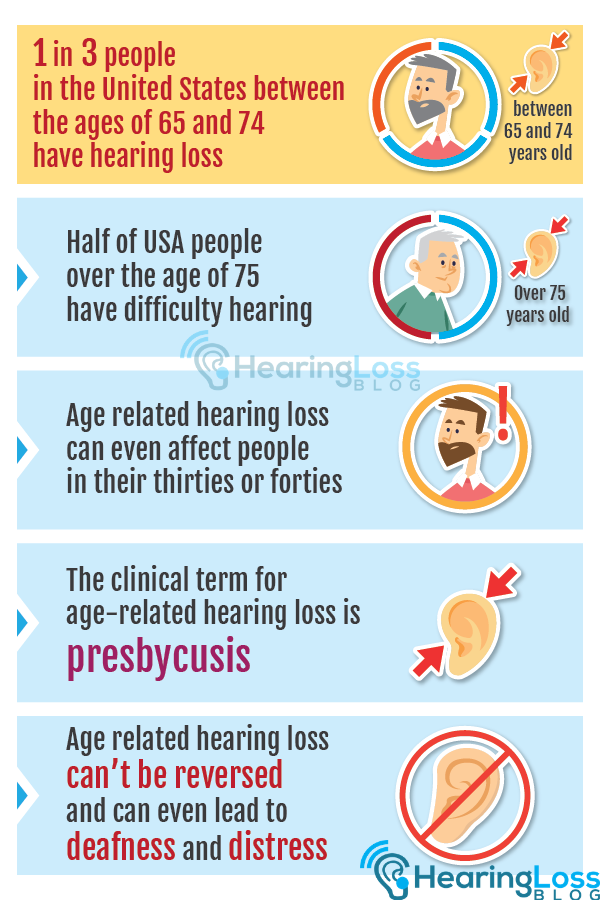
The clinical term for age related hearing loss is presbycusis, and though it isn’t a life-threatening condition, it can have a great impact on your quality of life if left untreated.
The loss of hearing due to aging is classified as a kind of sensorineural hearing loss that can’t be reversed and can even lead to deafness and distress, especially since ringing in the ear (tinnitus) is a common side-effect.
one in three people in the United States between the ages of 65 and 74 have hearing loss
How do we hear and why does loss of hearing occur so commonly?
Your ears are very complex organs, and they have to work hard in many ways so that you can hear the world around you. To do this, your ear is split into three sections:
- The outer ear
- The middle ear
- The inner ear
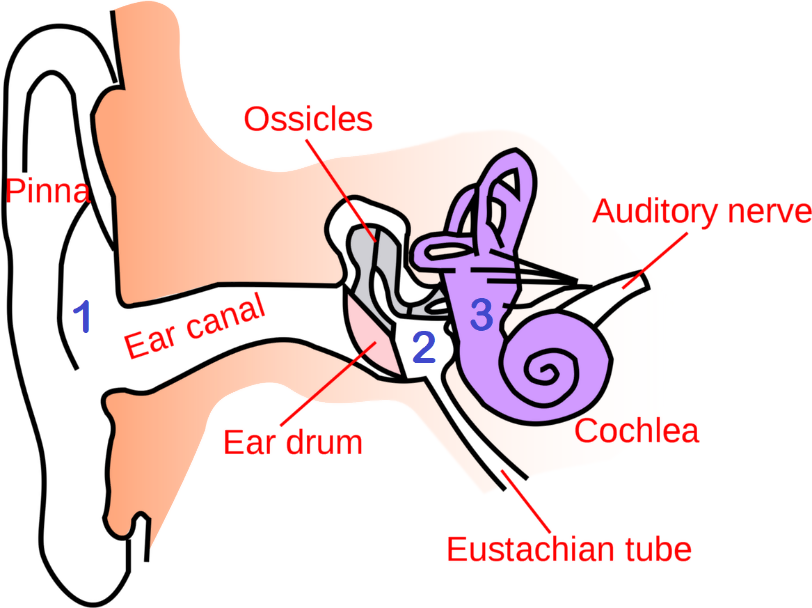
Your outer ear (1) collects the sounds around you and funnels them into your ear canal, which causes your ear drum to vibrate. This vibration shakes the tiny bones (called ossicles) in your middle ear (2), which helps move the sounds into the cochlea of your inner ear (3). Your cochlea processes these sounds and sends them up the auditory nerve to your brain, where you interpret what you’re hearing. It’s in this third section of your ear that age-related hearing loss mostly occurs.
Causes of hearing loss
Since you age gradually over the years, your hearing deteriorates gradually as well. This type of hearing loss (age related) is most often caused by damage to the inner ear, such as:
- Structural changes in your inner ear
- Impairment to the nerve that carries sound to your brain
- Changes to how your brain processes speech and sound
- Blood flow changes to your ear
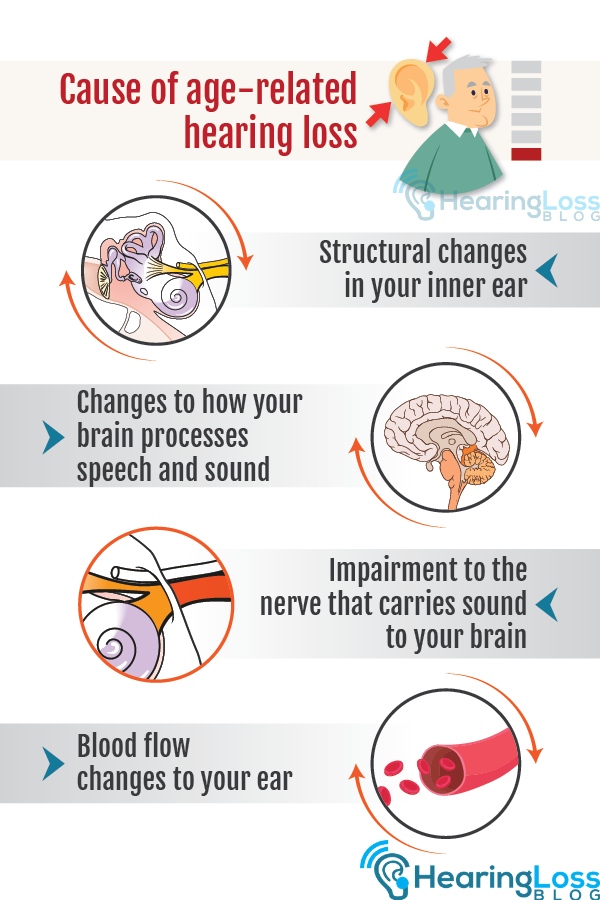
Other causes of hearing loss
One of the most common causes of hearing loss is damage to your cochlea’s tiny hair cells. These tiny hair cells are crucial to your ability to hear, as they are sensory cells that pick up sound waves as you hear them and change them into nerve signals. These nerve signals are then sent up to your brain and interpreted as sound and meaning.
Your cochlea’s hair cells cannot be repaired once they are damaged, and they don’t regrow either. Damage to these hair cells is also the most common cause of ringing in the ear (tinnitus) that many people experience. As this microscopic image shows, this means that age related hearing loss is permanent.
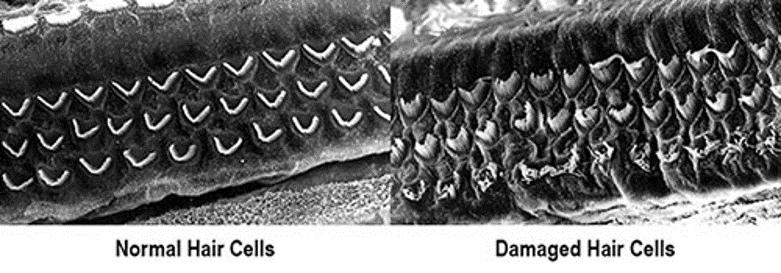
Image courtesy of Centers for Disease Control and Prevention
Something that many people don’t realize is that changes to other parts of your body can affect your hearing as well. Genetic, environmental, and lifestyle factors all play a role in potential loss of hearing, and studies have shown that the following issues can also act as causes of hearing loss:
- Certain medications
- Poor circulation
- Diabetes
- Family history of hearing loss
- Other genetic factors
- Smoking
- Exposure to loud noises
- Age-related changes to your eardrum or bones of your middle ear causing a permanent conductive hearing loss[A1]
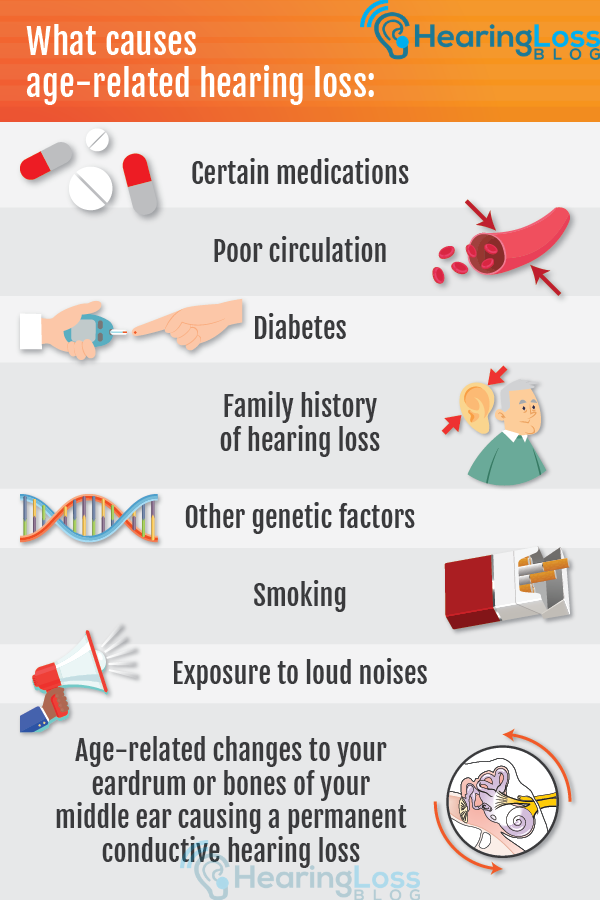
Because the damage is permanent, it’s important to know what your hearing loss treatment and prevention options are so that you can ensure your quality of life and preserve your hearing health as far as possible.
Diagnosing and symptoms of hearing loss
Diagnosis
The person who is qualified to diagnose you with age related hearing loss is an audiologist. They will conduct a full hearing test battery, which will test all the parts of your ear to see where the route of your hearing problem is.
If your hearing loss has been caused by gradual damage to your inner ear over time, then your audiologist will diagnose you with age related hearing loss.
Symptoms of hearing loss
If you have age related hearing loss, then you’ll probably only notice your symptoms later in life – generally at the age of 65 years or older.
Typically, you’ll first notice that you struggle to hear high-pitched sounds. These are also known as high-frequency sounds and are sounds like the rustling of leaves, whispers, and women’s voices. Most people also struggle to hear background noises and people when they speak softly.
One of the best known symptoms of hearing loss is having difficulty telling certain sounds apart, which affects your ability to understand what is being said, as words begin to sound similar or become confusing. This can be exacerbated by the ringing in the ear (tinnitus) that commonly occurs alongside hearing loss.
Sounds like the “th,” “s,” and “f” sounds are commonly confused because they are high-frequency sounds, which are difficult to hear. This means that someone with age related hearing loss would have difficulty hearing the difference between the words “thing,” “sing,” and “fling,” for example.
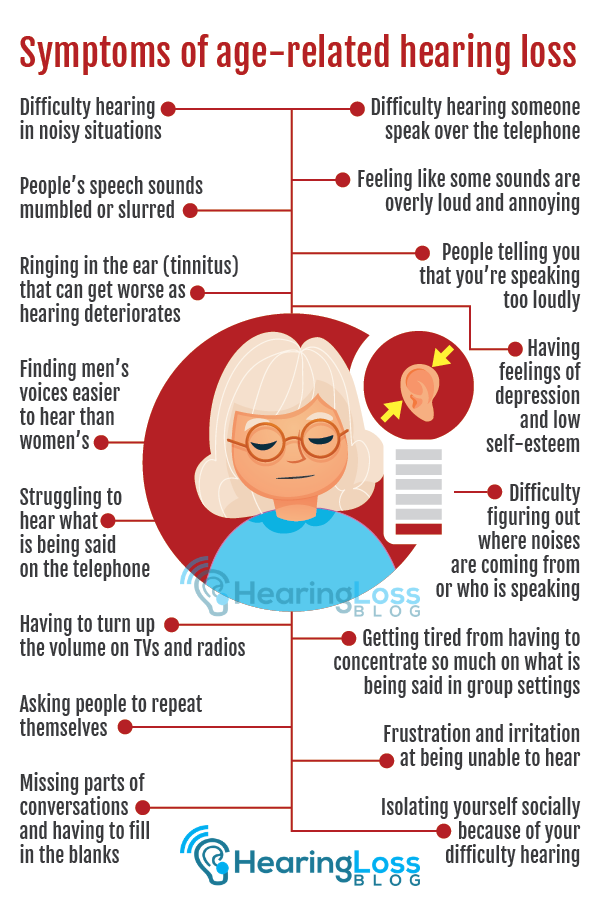
Other symptoms of hearing loss include:
- Difficulty hearing in noisy situations
- People’s speech sounds mumbled or slurred
- Finding men’s voices easier to hear than women’s
- Ringing in the ear (tinnitus) that can get worse as hearing deteriorates
- Struggling to hear what is being said on the telephone
- Having to turn up the volume on TVs and radios
- Asking people to repeat themselves
- Difficulty hearing someone speak over the telephone
- Feeling like some sounds are overly loud and annoying
- People telling you that you’re speaking too loudly
- Missing parts of conversations and having to fill in the blanks
- Getting tired from having to concentrate so much on what is being said in group settings
- Difficulty figuring out where noises are coming from or who is speaking
- Frustration and irritation at being unable to hear
- Isolating yourself socially because of your difficulty hearing
- Having feelings of depression and low self-esteem
A tool that audiologists use to diagnose and explain this difficulty during a hearing test is the “Speech Banana ,” which you can see below.
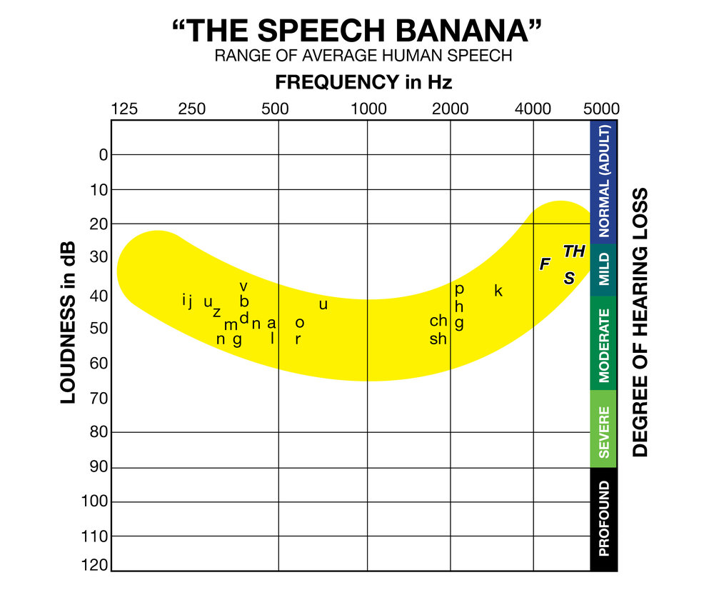
The Speech Banana is a banana-shaped range on an audiogram (the tool that your audiologist uses to chart your hearing ability) that shows the different frequencies and loudness levels that you need to be able to hear to understand speech. If you struggle to hear at certain frequencies and at certain loudness levels, then you’ll have difficulty hearing and understanding the speech sounds in those areas.
As you can see in the speech banana above, the sounds in the high frequencies (4000Hz – 5000Hz) that require you to be able to hear at a relatively low loudness level (30dB – 40dB) are the ones that are most often affected in age related hearing loss.
Hearing loss treatment and management
When it comes to hearing loss treatment, unfortunately there is no “cure”. Some things just can’t be fixed as our bodies age, and our hearing is one of them. However, there are management options available to you, and it’s important that you manage your age-related hearing loss, as if left untreated it can link to sadness, depression, anxiety, paranoia, emotional turmoil, insecurity, and less social activity.
There are plenty of ways for you to manage your hearing loss, prevent further damage, and still lead an active and fulfilling life. The type of management suggested to you by your audiologist will depend on:
- How old you are
- Your medical history
- Your general health
- The severity of your hearing loss
- The outlook of your hearing loss
- How well you will be able to handle certain procedures, medications, or therapies
- Your personal preferences and opinions
Hearing aids are the most common tool used to manage age related hearing loss. Because this condition affects your ability to hear soft, low volume sounds, hearing aids are a great solution, as their primary function is simply to amplify sounds and make them louder.
Unfortunately, not everyone benefits from using hearing aids, and the decision to wear them is a highly personal one; however, by pairing up with your audiologist and having regular checkups, you’ll be able to choose and personalize your hearing aids to suit your needs and lifestyle.
Traditional hearing aids only work well for sensorineural hearing loss, which makes them perfect for age-related hearing loss. We recommend the HearGift hearing aids V7 model for this purpose. If you are diagnosed with a conductive hearing loss or a mixed hearing loss, then a typical hearing aid won’t be suitable for you, and you’ll need to consult with your audiologist to discuss other options.
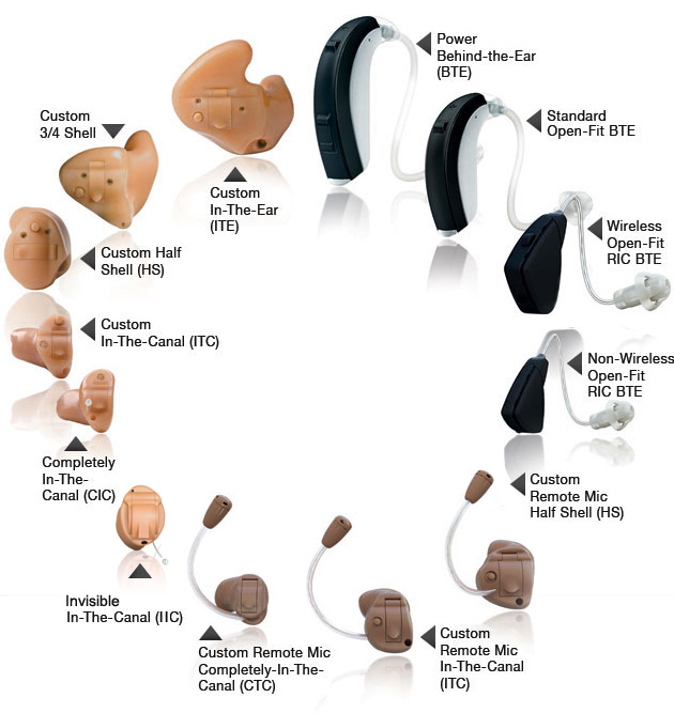
Other common management methods include:
- Using other assistive devices with your hearing aids like telecoils and FM systems
- Telling your friends and family about your hearing loss so that they are aware of your difficulties and can do their best to help you cope
- Making lifestyle changes like avoiding noisy situations and socializing with only a few people at a given time
- Asking people to face you when they are speaking to you
- Making sure your social gatherings are always well lit so that you can see people when they speak to you
- Asking people to speak louder and more clearly, but not to shout.
- Trying to minimize background noise as much as you can by turning off things such as your TV or radio when you’re not using them
- Wearing hearing protection when necessary
In extreme hearing loss cases, you can also:
- Undergo aural rehabilitation and training in lip-reading and speech-reading
- Learn sign language
Cochlear implants are rarely given in age-related hearing loss cases; however, everyone is different, and if you discuss your case with your audiologist, then they will be able to guide you on whether this is an option for you and what the way forward is.

You can find them at: heargift.com
Preventing age related hearing loss
Though you can’t stop yourself from aging or prevent age related hearing loss fully, you can take certain hearing protection precautionary measures to decrease the severity of condition and prevent it from getting worse. Some good hearing protection preventative measures include:
- Avoiding noisy environments and repetitive exposure to loud sounds
- Wearing ear protection in noisy environments
- Eating healthily and exercising regularly to prevent diseases like hypertension that put you at risk of hearing loss
- Controlling your blood sugar if you have diabetes
- Getting your hearing tested regularly
- Consulting with your audiologist immediately if you believe you are developing symptoms of age-related hearing loss
Not sure if you have a hearing problem?
If you’ve read this article and find that you’re still unsure about whether you might have an age related hearing loss or not, then answer some of our quick questions, and we can guide you on whether you should go and have your hearing checked.
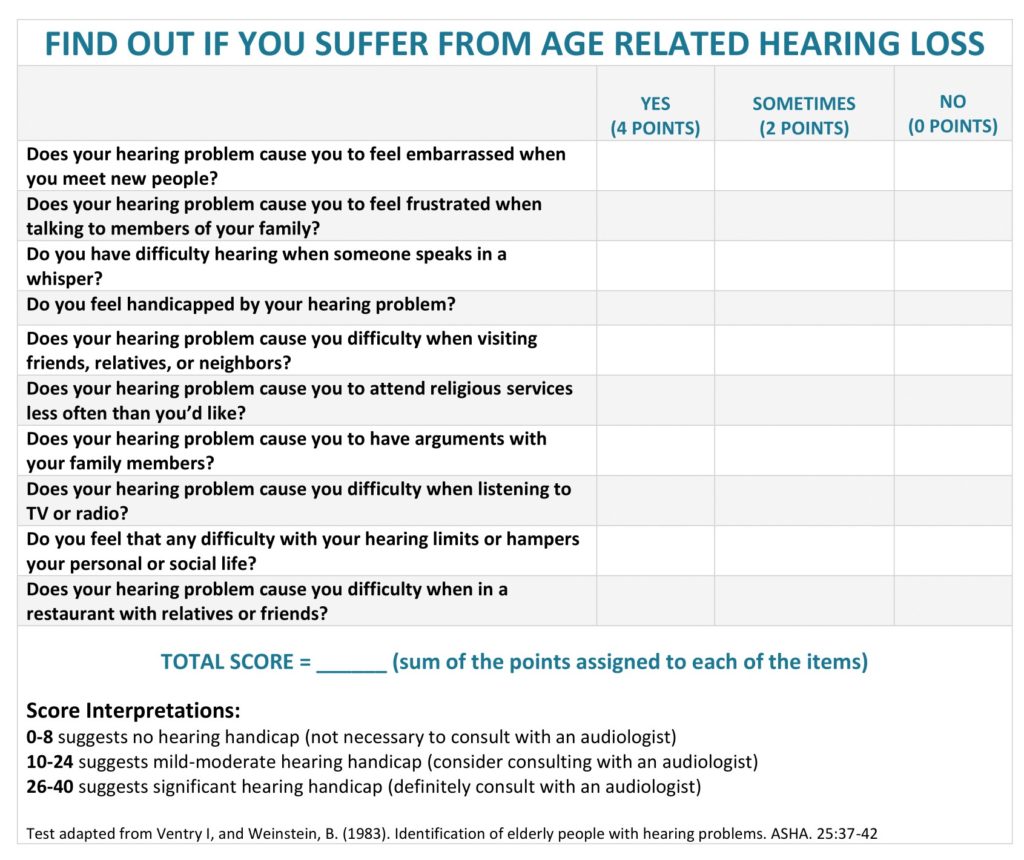
Do you have any questions or comments? We’d love to hear your feedback!
*Please note, the information listed in our blog, posts and forums is not and should not be taken as medical advice. Please consult with your doctor for diagnostics, treatment and medical information and advice.
